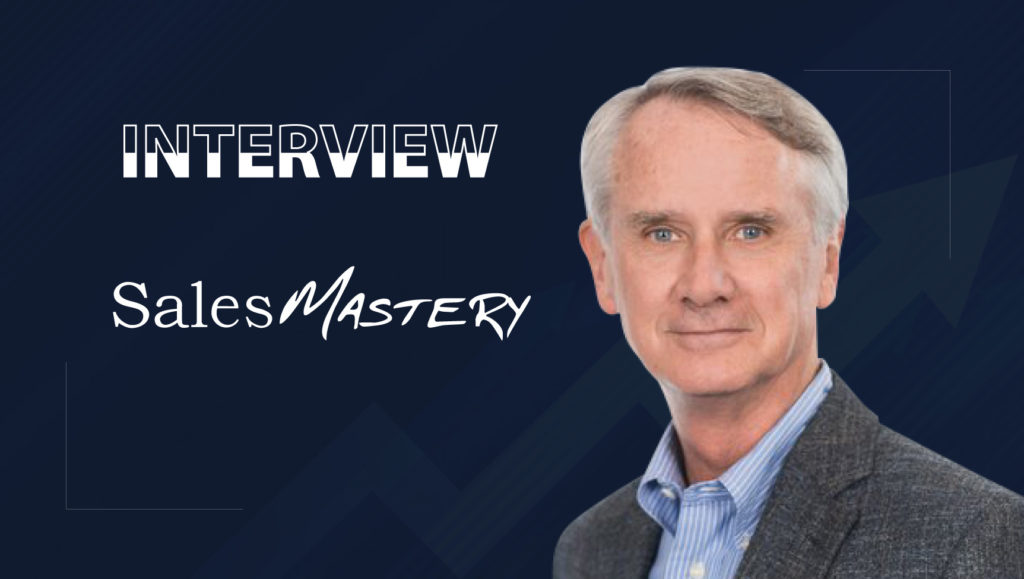Jim Dickie, a research fellow at Sales Mastery, a research firm that specializes in benchmarking case study examples of how companies are leveraging technology to boost sales joins us in this interview to share his insights on B2B Sales and SalesTech.
_____
Can you tell us a little about yourself (including your hobbies!) and your professional journey so far?
My undergraduate and graduate degrees were in Counselling and Psychology. I got into sales through IBM, they were hiring counsellors to take on sales positions since we were trained to ask probing questions. I went on to transition to the software industry from hardware and co-founded two firms. I then co-founded CSO Insights which for 20 years gathered data on the challenges facing B2B sales teams, why those problems exist, and how companies are leveraging people, process, technology, and knowledge to overcome those issues. Outside of work, I enjoy hiking and skiing in Colorado.
What’s a typical day at work like for you?
- That falls into two types of activities. The first is gathering and analyzing market data from sales organizations around the world on the areas that they seek to improve the performance of their sales teams; issues such as increasing revenues per sales professional, improving forecast accuracy, minimizing customer churn, increasing margins, reducing turnover, etc.
- The second activity is then interviewing sales executives who have already overcome those challenges to document the case study best practices they utilized to do so.
How do you address some of the major (common) challenges that you’re seeing in B2B Sales/Sales Teams today?
Based on our most recent study this year, topping the list were optimizing lead generation – on average salespeople today are still responsible for generating over 50% of leads they pursue, so how do we help them do that task. Increasing win rates of forecast deals – the average win rate today is less than 50% so how do we minimize competitive losses and no decisions? That’s a challenge. Increasing revenues per salesperson – each year over 90% of companies set higher revenue quotas for their salespeople, it’s a challenge to hit those increased revenue targets.
Read More: SalesTech Star Interview With Marta Aserigadu, Head Of Strategic Partnerships At Talent Alpha
What are your thoughts on the future of salestech pertaining to AI?
- We did a study this year of 450 firms, 1/3 each who had implemented AI for sales, were currently evaluating AI for sales, or had no current interest in AI. Clearly this was not intended to be a marketplace penetration study, as AI is it its embryonic stage in terms of adoption. But the performance numbers we gathered from firms who have been early adopters if utilizing AI capabilities to optimize sales performance were off the charts compared to our past studies.
- The vast majority of the study participants stated that in 3 years AI will be either a must-have, or a key addition to a company’s sales enablement technology suite.
Can you tell us about some innovative Sales campaigns you’ve run at SalesMastery?
The one that comes to mind was taking the data from our annual sales performance optimization study, we created an assessment tool that companies could use to see how their sales performance compared to their peers. This shed a lot of light on the areas each individual company was under performing at, and that generated great qualified leads for advisories services, as these firms wanted to see how to improve in those areas.
Could you also throw a little light on the SalesTech stack you used to help achieve better results?
- We start with a core CRM system (Salesforce, Dynamics, SPA, Oracle etc.) We then look at specific aspects of customer life cycle management; market segmentation, key account planning, lead generation, sales persona analysis, needs analysis, education solution configuration, closing solution implementation and account management, and determine which areas have the biggest need for improvement.
- Based on that we define what “better” would look like in terms of process optimization. That then sets the stage for us to evaluate sales enablement solutions that can help improve sales efficiently and effectiveness in those specific aspects of selling.
What are some of your 5 “must-haves” or “must-dos” for early users of AI-powered sales tech tools?
- A clear mandate to the sales organization that the company is going to be adopting AI and why. You must have a culture that is ready to embrace change.
- Clean information, and more the better. AI needs reliable and current data to process.
- Direct alignment of AI capabilities to the challenges that sales team is facing. There are no all-encompassing AI for sales suites today, but there are tools that can solve some specific challenge much better than ever before.
- A well planned roll out – AI will change how people do their jobs, in some cases dramatically, so you need the right training and support services in place to help salespeople make that transition.
- Sales management needs to ensure that their salespeople learn and use the solutions, This needs to be something that salespeople are required to do.
Read More: SalesTechStar Interview With Geoff Rego, CEO & Co-Founder At Hushly
Can you share some best practices when it comes to “choosing the right Sales Tech tool’ –> what do you see teams miss out on most when implementing/integrating new sales tools?
- Start with knowing the specific problem(s) you need to solve before you look at any AI solutions.
- Work with the vendors to then see how they can help overcome those objectives.
- Interview existing users who have already implemented these solutions to see what lessons they learned.
- Understand the vendor’s long-term product road map, Machine learning needs to be part of their strategy of improve their solution set over time.
What’s your smartest sales hack that you’d like to share with the audience?
Making sure we look at each opportunity is really aligned to the customer’s journey. It is not enough that you decide who you want to engage, and why. You need to also know why they would want to engage with you. If you can’t do that you shouldn’t be pursuing an opportunity.
Your biggest learning so far in Sales/Sales Tech
We have to get the processes right before we turn to tech. If we throw technology at bad sales processes we will just end up doing inefficient and ineffective things faster than we have done before.
Tag (mention/write about) the one person in the industry whose answers to these questions you would love to read!
Rob Jeppesen, CEO Xvoyant. He is the most knowledgeable person I know in regard to optimizing sales management.
Your favorite Sales/SalesTech quote.
In terms of optimizing sales performance, done never is!” we will continually need to be adapting to changes in the marketplace.
Read More: SalesTechStar Interview With Ken Ferguson, SVP Of Global Sales At Visier
Write in to psen@martechseries.com to learn more about our exclusive editorial packages and programs.

Jim Dickie is a Research Fellow for Sales Mastery; an independent research firm that focuses on profiling case study examples of how firms in the B2B marketplace are leveraging sales process, CRM, AI and knowledge to optimize revenue performance. Jim has over 30 years of sales and marketing management experience. Jim began his career with IBM and Sterling Software and then went on to launch two successful software companies. Jim then went on to co-found CSO Insights, which was acquired by Miller Heiman Group. Jim is also a contributing editor for CRM Magazine, CustomerThink, Top Sales World, and a contributing author for the Harvard Business Review.





















